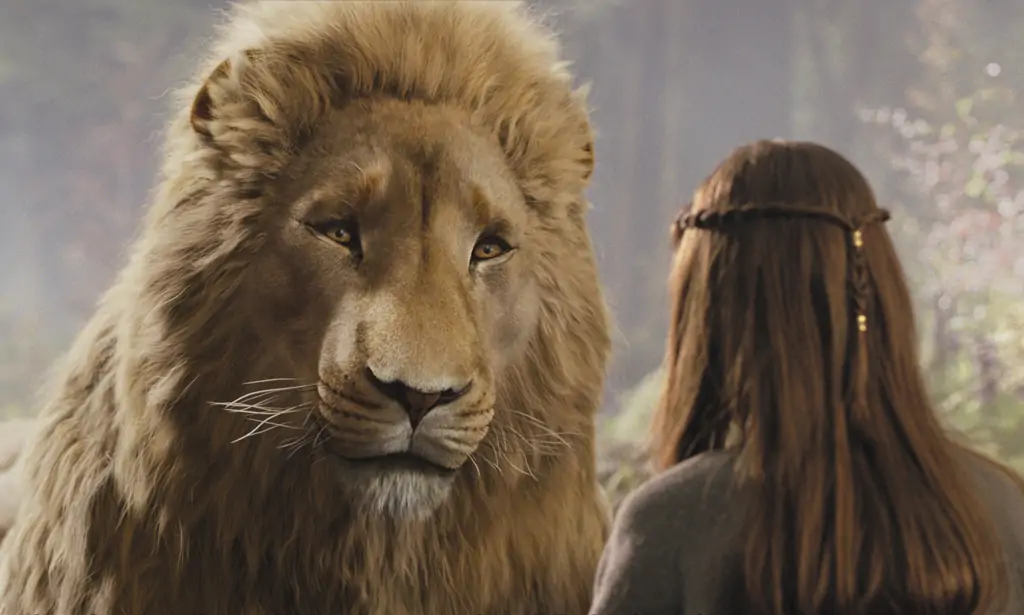
Lucy saw a glimpse of Aslan and was ready to follow him. She tried to convince her companions to go toward where she had seen the Great Lion, but she was met with silence, skepticism and humiliation. The Chronicles of Narnia still echoes what we face in the modern world.
In Prince Caspian, the fourth Narnia book, the Pevensie children return to the realm, but 1300 years have passed. The land we fell in love with is fallen and broken. The magic has disappeared and men have invaded and drove out the talking beasts that lived and thrived there. As the Pevensies endeavor to overthrow the men and save Narnia by putting Prince Caspian, the rightful king, back on the throne, their journey finds them lost after an ill-advised shortcut. This is when Lucy sees Aslan and tells the others he wants them to follow him, but in the face of their doubt and dissension, she relents. Instead, the party falls victim to an ambush, and their challenges deepen.
Of course, most will know Aslan as a Christ figure and an image of God the Father. When it comes to following him alone or not at all, Lucy makes the same choice we often do and remains with the crowd instead of stepping out in faith. Can we blame her, or ourselves when we do likewise? Aslan did not call Lucy by name or silence the naysayers or spell out a coherent plan. He just showed Lucy a passing glimpse of himself.
Lucy’s quest led her and her companions through a land where many told her she was silly for thinking she had seen the mystical King. In that time for Narnia, things had become ordinary. For us, our journey is, as Eugene Peterson terms it, “a long obedience in the same direction.” These days, most will tell us faith is a fairy tale, and social media serves up comparison and conformity for breakfast, lunch and dinner. In the end, amid the noise and criticism, we stand isolated, perhaps wondering if we ever even glimpsed the King.
In Prince Caspian, when the group stops for the night, Lucy is awakened “out of the deepest sleep you can imagine, with the feeling that the voice she liked best in the world had been calling her name.” She awakes to magic and mysticism, with wide eyes and a full heart, to trees that are dancing. Narnia was awakening with her, and then before her was the Great Lion, Aslan. Lucy had failed him. She had not followed, yet he came to her, drawing near in love.
Lucy embraces him, saying, “Aslan, you’re bigger.”
“That is because you are older, little one,” he answers.
“Not because you are?”
“I am not. But every year you grow, you will find me bigger.”
This is what happens when we leave the pressing crowd and log off the feeds for a time. We can wake up like Lucy to notice trees dancing under the stars, breathing in the magic of eternal life, we grow and see our King, bigger.
Aslan greets Lucy with celebration, but he’s quick to remind her of purpose and commitment. A growl rises and Lucy knows it’s a loving rebuke for her refusal to follow him. She apologizes, then tries to excuse herself, saying she couldn’t have come to him alone. Then mid-sentence she acknowledges that of course she could have followed, because she would not have been alone with him.
Lucy wants to know what would have happened and what will happen. We share her longing for certainty. There’s nothing we can’t find on Google. We seek answers from social media about everything from what to wear to how to vote. We want certainty in a society that tells us we are foolish to step out on anything less than statistics and crowd sourcing. In Caspian, Aslan does not indulge Lucy’s questions, instead calling her to himself and to action, no matter what. “I will wait here,” he says. “Go and wake the others and tell them to follow. If they will not, then you at least must follow me alone.”
Lucy’s brothers and sisters are not easy to wake and they do not see Aslan right away. As they start to move in obedience toward his call, they begin to see the shadow of a lion, and then eventually Aslan himself. Standing in the simple courage it took to honor her experience with the King, Lucy is moved from humiliation and isolation to become an agent for change, unity and ultimately salvation. As Aslan sends her as an ambassador to her family and friends, the lion tells her she is now a lioness, and says Narnia will be renewed.
We are Lucy, seeing glimpses, afraid to step away from the crowd, bullied by criticism. Or maybe we are her brothers and sisters, having a hard time seeing the Great Lion. No matter who we are when we catch a true glimpse, even if it is of His shadow, it is a call to courage. We are called to follow until the trees begin dancing and our head is buried in His mane. Then He will inevitably send us to call others and show them the way He is walking. And as Aslan did, our King will tell us, “We have no time to lose,” for the kingdom is under attack and His work is salvation.






















